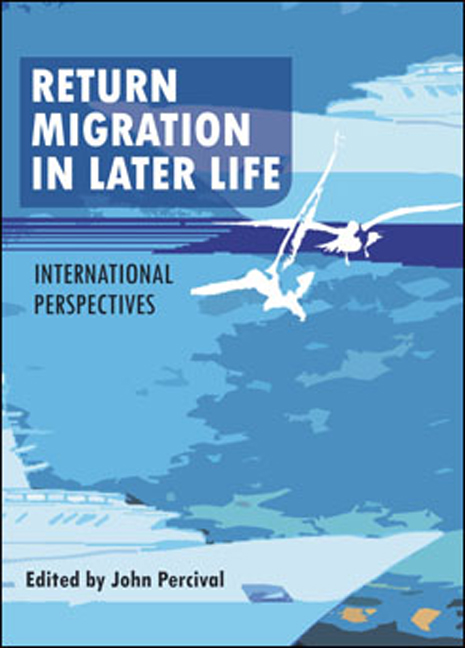Book contents
- Frontmatter
- Contents
- List of tables and figures
- Notes on contributors
- Acknowledgements
- one Charting the waters: return migration in later life
- two Older immigrants leaving Sweden
- three Place and residence attachments in Canada’s older population
- four Ageing immigrants and the question of return: new answers to an old dilemma?
- five Caribbean return migration in later life: family issues and transnational experiences as influential pre-retirement factors
- six ‘We belong to the land’: British immigrants in Australia contemplating or realising their return ‘home’ in later life
- seven Diasporic returns to the city: Anglo-Indian and Jewish visits to Calcutta in later life
- eight Returning to ‘roots’: Estonian-Australian child migrants visiting the homeland
- nine Ageing in the ancestral homeland: ethno-biographical reflections on return migration in later life
- ten ‘The past is a foreign country’: vulnerability to mental illness among return migrants
- eleven The blues of the ageing retornados: narratives on the return to Chile
- twelve Concluding reflections
- Endnotes
- Index
ten - ‘The past is a foreign country’: vulnerability to mental illness among return migrants
Published online by Cambridge University Press: 01 February 2022
- Frontmatter
- Contents
- List of tables and figures
- Notes on contributors
- Acknowledgements
- one Charting the waters: return migration in later life
- two Older immigrants leaving Sweden
- three Place and residence attachments in Canada’s older population
- four Ageing immigrants and the question of return: new answers to an old dilemma?
- five Caribbean return migration in later life: family issues and transnational experiences as influential pre-retirement factors
- six ‘We belong to the land’: British immigrants in Australia contemplating or realising their return ‘home’ in later life
- seven Diasporic returns to the city: Anglo-Indian and Jewish visits to Calcutta in later life
- eight Returning to ‘roots’: Estonian-Australian child migrants visiting the homeland
- nine Ageing in the ancestral homeland: ethno-biographical reflections on return migration in later life
- ten ‘The past is a foreign country’: vulnerability to mental illness among return migrants
- eleven The blues of the ageing retornados: narratives on the return to Chile
- twelve Concluding reflections
- Endnotes
- Index
Summary
Introduction
A recent report by the United Nations Development Programme (2009) provided an estimate of 740 million internal migrations and 214 million international migrations worldwide. Significantly, most international migrants moved from one developing country to another or between developed countries, just over a third moved from a developing to a developed country (OECD, 2009). The high level of involuntary migrations caused by global warming and natural disasters, armed conflicts, political tension, deportation and illegal human trafficking are not expected to diminish. With such a high level of geographic mobility the need to record and explore the changes that occur as a result of migration is essential as migration can affect the economic, health and social sectors in both the host and sending nations (Katseli et al, 2006; OECD, 2009).
Migration always involves a cost to the individual migrant, his or her family, their community and the wider society (Ratha et al, 2011: Silver, 2011). Thus, the act of voluntary migration, regardless of motivation and ultimate outcome, demands a choice; certainly between alternative places but often between communities and life trajectories. With choice comes loss. While migration tends to improve the economic standing of an individual, compared to what might have been expected in their home country, the cost to the migrant's sense of wellbeing appears considerable.
One of the most notable costs of migration on individual migrants and their families is the possibility, for some, of deteriorating mental health. Since Ødegaard's study of schizophrenia among migrants to the US (Ødegaard, 1932), the relationship between migration and mental illness has attracted considerable attention from psychiatry and the social sciences. Explanations for the excess rates of mental disorder among migrant populations range from the biological and cultural to environmental, race and class. Further, while problems related to identity and belonging have been theoretically explored with regard to migrant stress, empirical examination is lacking.
Within such theoretical perspectives, researchers have explored the concept of the myth of return among various migrant populations, that is, the failed ambition of returning to homeland and the existential anxieties and/or the psychological distress provoked by this realisation (Al-Rasheed, 1994; Leavey et al, 2004; Sinatti, 2011). However, less explored still is the psychological wellbeing of those people who do return, usually in middle to later life stages.
- Type
- Chapter
- Information
- Return Migration in Later LifeInternational Perspectives, pp. 195 - 218Publisher: Bristol University PressPrint publication year: 2013



